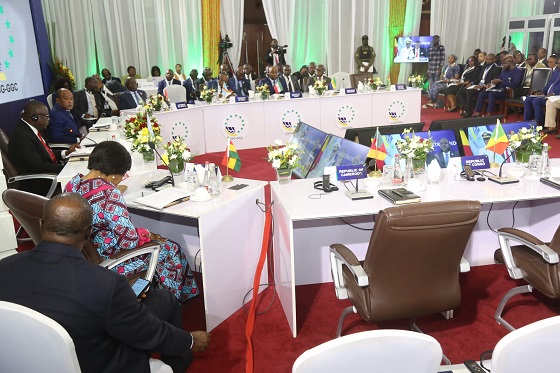President Akufo-Addo has urged the Gulf of Guinea Commission to identify alternative sources of funding.
According to President Akufo-Addo, who is the chairman of the Gulf of Guinea Commission, 23 years after its inception, the Commission cannot continue to rely on the assessed contributions of member states.
The Minister for Defence, Dominic Nitiwul, read a speech on behalf of President Akufo-Addo at the opening session of the Sixth Ordinary Session of the Assembly of Heads of State and Government of the Gulf of Guinea Commission, held in Accra on Tuesday, August 6, 2024.
Though calls for the determination of alternative sources of funding have not yielded results, President Akufo-Addo believes that the Commission had several opportunities to generate additional revenue to support its operations, given the vested interest in the Commission’s output.
He bemoaned the recent trend in the payment of assessed contributions of Member States, coupled with the expanding mandate of the Commission, saying that it indicates that the continued total dependence on Member States for funding is unsustainable in the medium to long term.
“Once again, the Executive Secretariat is called upon to take necessary steps to identify alternative sources of funding for the organisation. Excellencies, our world is no longer stagnant,” he added.
TRANSFORMATION
The President observed that the establishment of the Gulf of Guinea Commission was from a shared vision amongst Member States, to ensure maritime security and promote regional development for the benefit of our people.
He remarked that since its inception in July 2001, the organisation has undergone significant transformation in response to the increasing complexity of criminal activities in the Gulf of Guinea, necessitating the adoption of previously unanticipated strategies and policies.
Aware of the necessity for international transformation, the Gulf of Guinea Commission, according to its chair, President Akufo-Addo, has been working since 2015 to implement strategies aimed at revitalising the Commission and enhancing its relevance to the geopolitical affairs of the Gulf of Guinea region.
Although the initial revitalisation efforts have yielded positive outcomes, such as improved interaction with African regional economic communities and the African Union, especially regarding the 2050 Africa Integrated Maritime Strategy, he said that the Commission was still far from achieving its aspirations, more particularly in the light of the ongoing threats to the security and resources in the Gulf of Guinea.
He opined that “a rejuvenated Commission is essential to our collective pursuit of peace, security and stability in our respective countries. Let me state that no single country can address independently the multiplicity of evolving maritime threats within their territorial waters.”
He continued that, “it is thus imperative for all concerned nations to build their capacities through strengthened cooperation and enhanced information sharing amongst countries bordering the Gulf of Guinea.”
TECHNOLOGY
The President stated that in this age of technology, the world has witnessed rapid transformations in all aspects of its lives, making it no longer prudent to be fixated on old ways of doing things. He said it was also precarious to remain indifferent to the fast-paced transformations occurring around us, adding that these developments impact heavily on the organisation as well.
To attain relevance, vibrancy and attractiveness, President Akufo-Addo recommended to the Commission to re-examine the ways the organisation has been functioning over the last or past 23 years and sincerely ask itself critical questions.
“I am very confident that we are aware of the immense potential and capability of the organisation if steered in the right direction,” he added, and he urged all Member States to show more political commitment at the highest level of government.
ATTENTION
In his address, the Executive Secretary of the Gulf of Guinea Commission, Jose Mba Abeso, indicated that persistent threats, such as piracy and environmental degradation, require the constant attention of the Commission.
“We need to strengthen our cooperation and adopt common policies to respond effectively to these challenges.
“Since our last summit, we have also made significant progress. The Commission has launched several initiatives to strengthen maritime security, reduce piracy, and fight illegal fishing,” he said.





